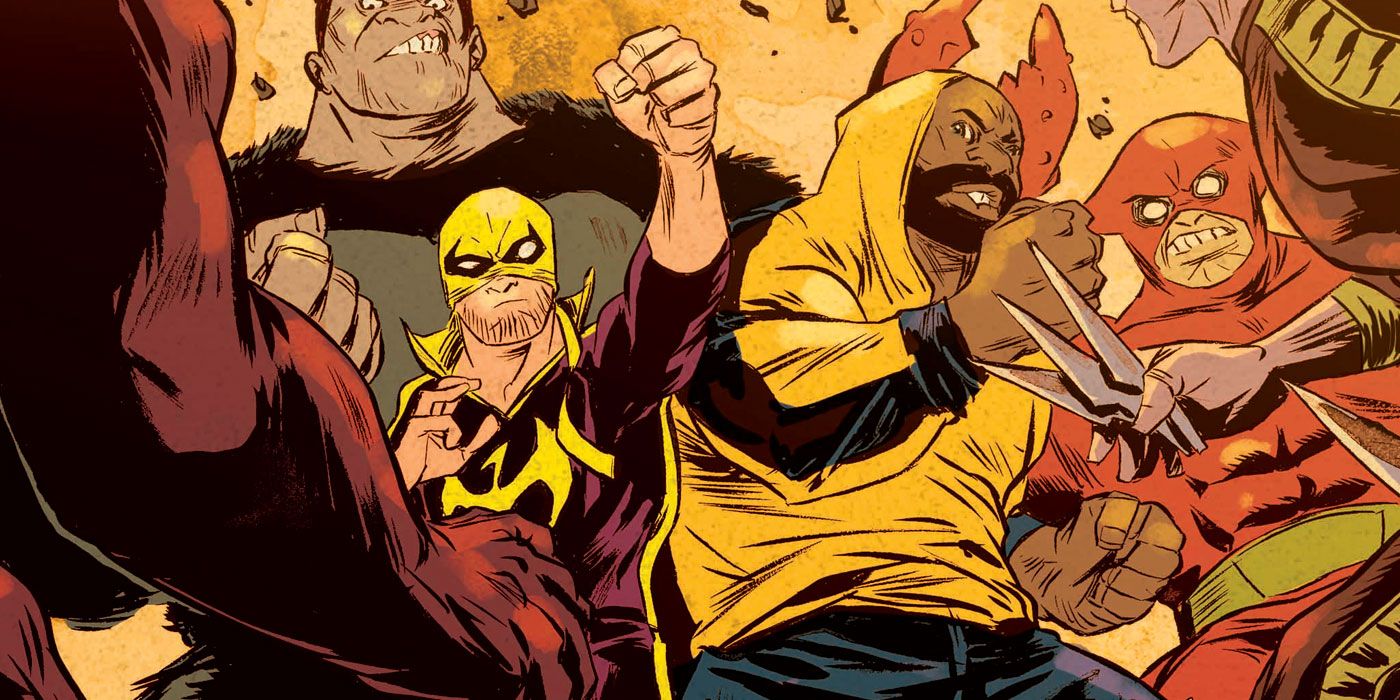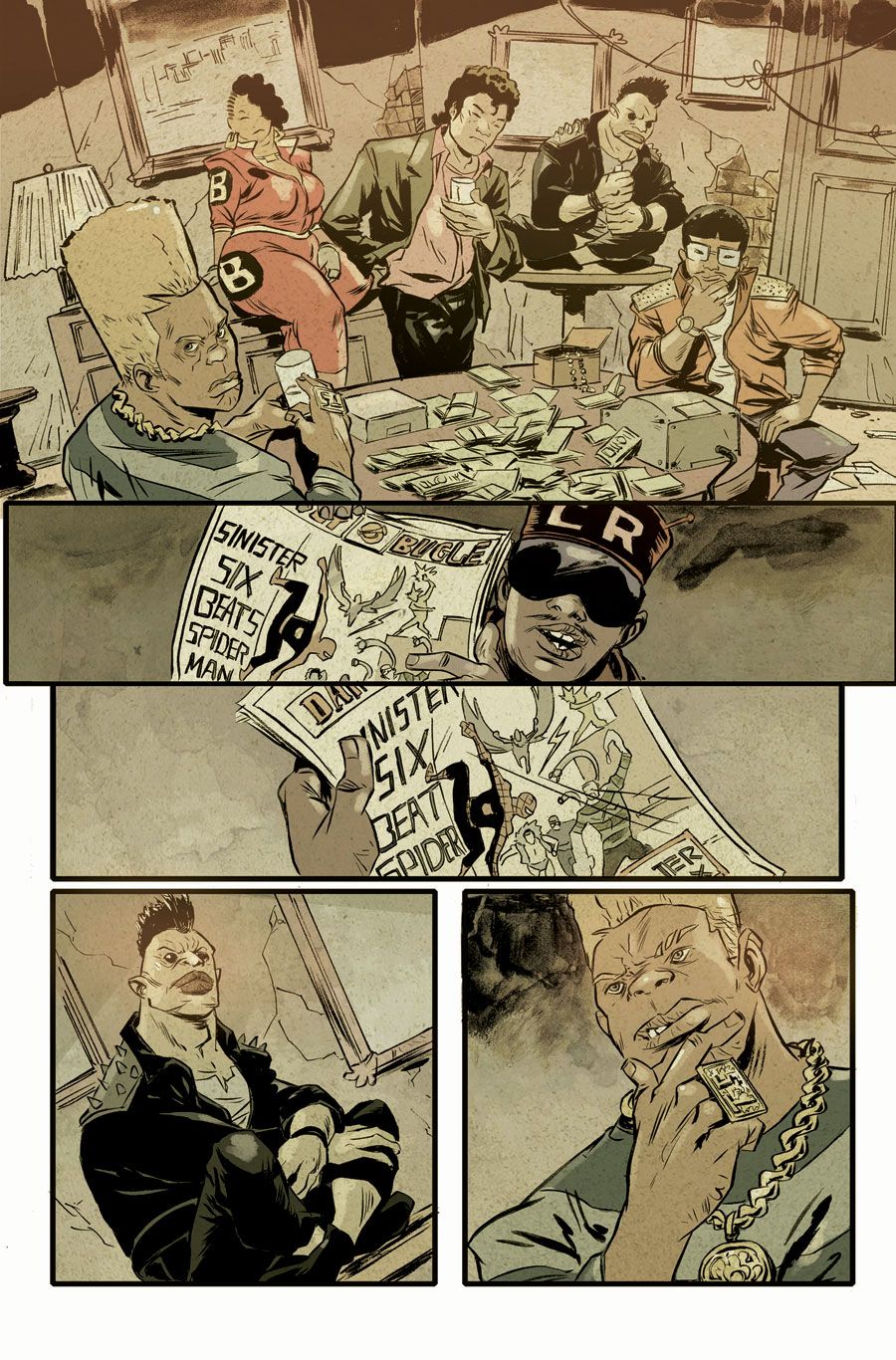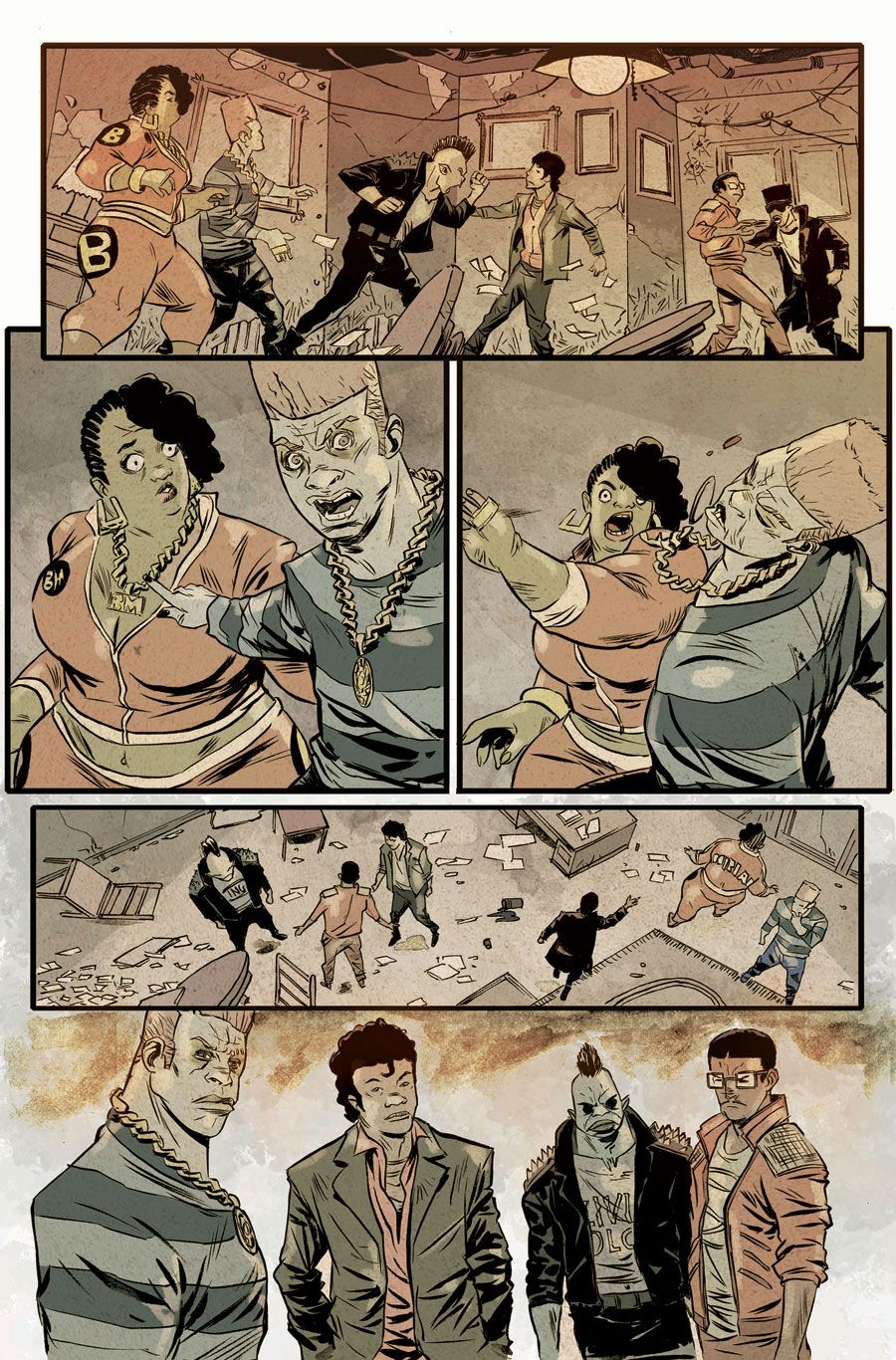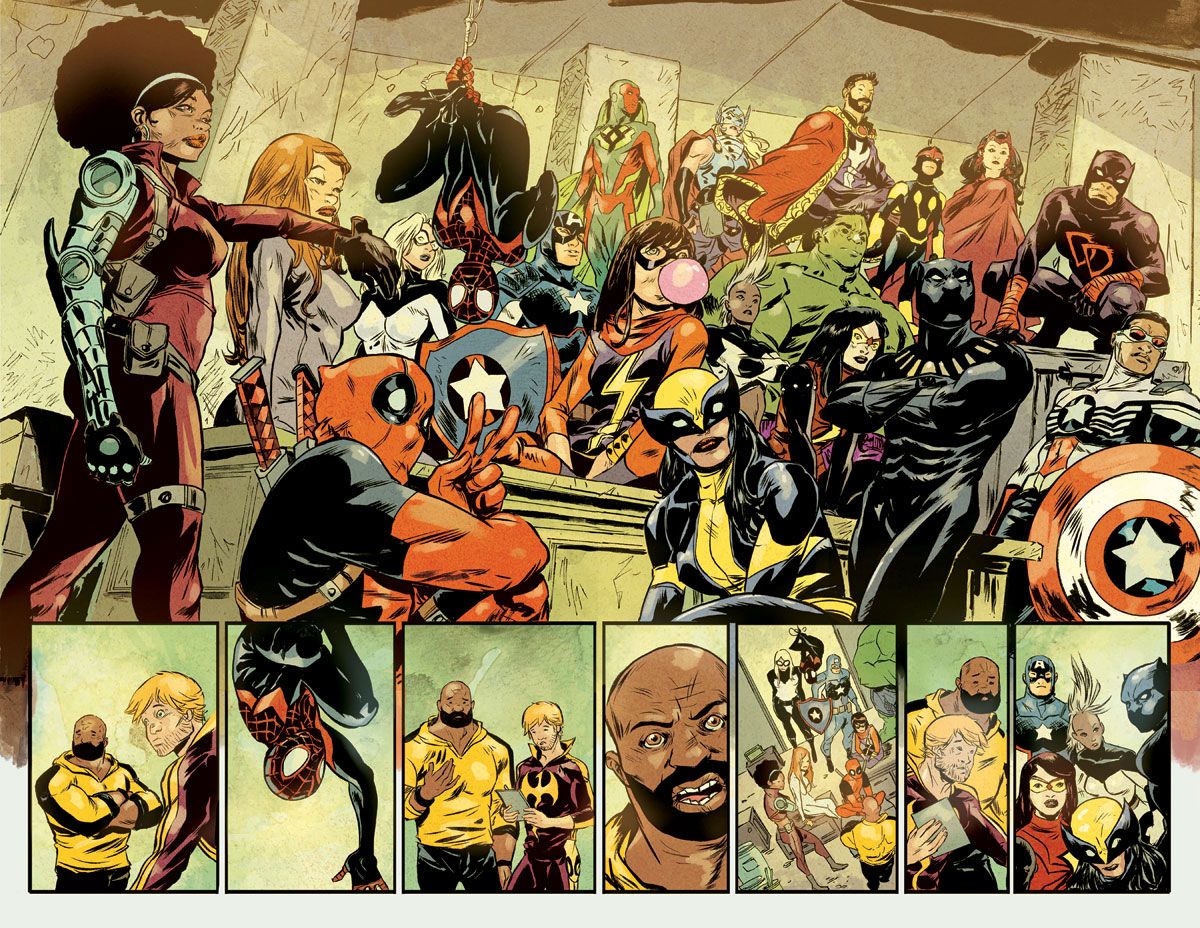SPOILER WARNING: The following interview contains major spoilers for "Power Man & Iron Fist" #10, on sale now.
Harlem is about to get a whole lot more dangerous. The New York neighborhood's resident crime lord, Tombstone, has become the target of a whole host of strange, bizarre and cunning super powered mobsters, including second generation, adolescent, criminal mastermind Alex Wilder, the infamous Runaway-turned-villain.
Stuck in the middle of this brewing mob war are is Harlem's best hope for peace: Luke Cage and his best friend Danny Rand, the stars of the current “Power Man & Iron Fist” comic by writer David Walker and artist Sanford Greene.
RELATED: Missing Links: 15 Burning Questions After Bingewatching Luke Cage
Luke and Danny will step across 110th Street to confront the super powered gang violence plaguing their home in Issue #10, kicking off the series' “Harlem Burns” arc. The game-changing story also promises to explore the ties between classic Luke Cage foes like Cottonmouth, Black Mariah and Mister Fish, as well as the motives and machinations of Alex Wilder.
CBR: One of my favorite characters from “Runaways,” Alex Wilder is the villain of this next arc. What inspired you to bring Alex into the book?
David Walker: Alex is somebody I've wanted to bring back for a long time. In the really early days when we were developing “Nighthawk,” I kept pushing for him to be a villain or the villain of the series. There was a lot of pushback on that, and there was a feeling that it would effect the tone of the book too much.
So I gave in, but I never gave up the idea of having Alex Wilder as a villain. Part of that is my love of the character from the “Runaways.” I'm an old school fan of that book from when it was first coming out, and -- I can't remember exactly what story arc it was from, but there was a story where a voice was guiding the Runaways from some other realm. It turned out it was Alex in a sort of limbo/purgatory state. I latched on to that. It was a really powerful image.
Then Dennis Hopeless brought Alex back in “Avengers Undercover,” and I was like “Oh, great! Alex is back!” He had a bit of a fling with Nico in the series, but that was it. I really like Dennis' writing, but this was one of those moments where as a writer I went, “There's so much more you could do with that character.”
Things started coming into place with “Power Man and Iron Fist,” where I wanted a villain that we could really reinvent, could pose a serious threat, and was recognizable to people, but wasn't clearly defined as a villain, yet. I just started building upon that, and as we were working on that first story arc, I realized there's an opportunity to bring Alex in here. Not at that very moment, but somewhere in the near future, so we can build him up in the way that I saw him.
Part of the desire was when I go to conventions I meet a lot of black teen and millennial readers who call themselves “blerds” and, I hate to say that they're a group of cool kids, because then it makes me sound like an old man, right? [Laughs] They're really cool people, though, and they were all looking for a hero -- but what they really need is a villain.
For me, Alex was an opportunity as a writer to hopefully create -- and I may fail -- a really complex villain who's truly menacing, but you begin to go, “Oh! I get their villainy. I get why they're the bad guy.” I've been having a lot of fun playing with that. We won't cover all this stuff in the first arc, but this isn't a guy who is just trying to make his parents, who were famous gangsters, proud. He expected to inherit the family business and make his dad happy. Then he sort of inadvertently is responsible for the death of his parents. I think there's a lot of complexity to be mined there.
I also think he does not look menacing to me in any way, shape, or form, which I find really kind of awesome. Because sometimes the worst villains are the ones that aren't what we expect them to look like.
So Alex's motivation for his actions go beyond being a successful crime lord like his parents.
Yeah, there's a lot of psychological stuff there. Of course there's the Freudian thing of wanting to make his parents happy. There's also some stuff that we have planned that might not make into the book, but my current plans do include showing what happened to Alex after he died. Because he died and comes back in “Avengers Undercover.” In the real world that took about six years, but in Marvel time we're not exactly sure how much time he was gone. So what happened to him? And what happens when you come back from the dead? Those are some pretty interesting questions.
Those questions have always fascinated me because in superhero comics so many characters have died and come back to life, which is not something that of course happens in real life. So seldom do we see the ramifications of what happens to somebody who has actually been dead for years at a time. Characters like Bucky Barnes appeared to have died, but there's a big difference between where he was and where Alex was.
That's what I want to explore. I want to explore how the circumstances that molded him into who he is now happened after he died.
Alex isn't the only villain featured in “Harlem Burns.”
We have a ton of them -- Tombstone, Black Mariah, Cottonmouth, Piranha Jones, Mister Fish, Black Cat. Honestly, we probably have too many. I went a little crazy in bringing in villains. I fell into the trap of, “Oh, my God! I'm writing for Marvel Comics! I better do everything I wanted to do all in one fell swoop!” I didn't do that in the first story arc. I think I managed to maintain a good balance, but it's all working out.
I'm fascinated with the history of Harlem and the gang wars that have gone on over the decades. This was an opportunity to take years of research that I've done, fictionalize it, and show some of the inner dynamics in that universal theme that there's no honor among thieves. I want to show that in fact sometimes there is honor among thieves, but that manifests in a weird moral code.
What's it like bringing back some of the more infamous Luke Cage villains, like Mister Fish, or Cottonmouth, who people know from the “Luke Cage” show, but they don't know his Marvel Universe incarnation?
RELATED: The Glory of Luke Cage’s Nemesis, Mister Fish!
I always thought Mister Fish was on of the most ridiculous characters in the Marvel Universe. I was talking to Sanford about him at one point. He was like, “Oh, man! That guy would be so cool to draw!” I was like, “Okay, we'll put him in so you can have the opportunity to draw him. Then Sanford fell in love with drawing the character. He was like, “You've got to use more of Mister Fish!” He was only meant to be a minor player, though. So part of this was rethinking some of my strategies for Mister Fish.
With Cottonmouth, I knew from the beginning that I was going to bring him in, even before he was announced on the “Luke Cage” TV show. Then, the moment I saw the “Luke Cage” TV show, I saw that they had done a better job of reinventing him then I had planned. Together, Sanford and I had reinvented Black Mariah just as the TV show had done. Both of what was done were drastic overhauls of the original character. With Cottonmouth, the question was, “What are we going to do with him?”
Readers' expectations were really challenged when our book first came out, but then the TV show came along and that set a whole different bar. You don't want your comic to become a knockoff of the TV show, and there's no real communication back and forth between the two telling us to use or not use Cottonmouth. What's really interesting is, I suspect the producers of the show had a long wishlist of characters and ideas that was very similar to my wishlist. Because watching that show, I realized that the show's writers grew up watching the same movies I had. They had also read the same books and comics as I had, and had a lot of the same ideas about what would be really interesting.
There was an episode of “Luke Cage” that I watched where I was like, “Oh! This is their tribute to the Berry Gordy movie with Taimak, 'The Last Dragon.'” Sanford and I are coming up on a year of issues of the book, but we've been working on it for a year and a half. Early on we had a discussion about doing some sort of tribute to “The Last Dragon.” Then I watched that episode of “Luke Cage” and they beat us to the punch. [Laughs] That's not to say that we can't do a tribute. It just means that I need to rethink what it would look like.
There's a lot of stuff like that, and I think with Cottonmouth especially, that's a great example of taking a character that, to be 100 percent honest, in the comics was always one dimensional, at best, and really turning them into what I think is a great villain. When I saw Cornell Stokes on the TV show, as a writer I got all Homer Simpson when he thinks about donuts. It was like, “MMMM . . . villainy.” [Laughs] They hit the nail on the head. I enjoyed the show immensely, but if nothing else, what they gave me with that one character in particular was so refreshing. It also reinforced my ideas about Alex Wilder, and some of the decisions that I'm making with him including the role he's going to play in future storylines.
Now that we have Cottonmouth back, he's going to have some interesting stuff going on. We're going to see some interesting stuff between him and some of the other villains.
Danny and Luke went through a lot in your previous arc, which tied into “Civil War II.” What's the dynamic like between them when “Harlem Burns” begins?
Danny doesn't trust the system that he believed in any more, and this was the first time in a long time where Luke was unsure of what he was going to do. Because of the predictive justice premonition that Luke was going to break everyone out of prison, Luke really thinks what happened in that arc might have been his fault. He doesn't blame Danny.
Post-“Civil War II,” Luke and Danny are at odds, to a large extent, with other characters in the Marvel Universe. I've been reading “Champions” by Mark Waid and Humberto Ramos, and Power Man and Iron Fist are like the old man version of that group. They're the ones who are like, “You guys are doing it all wrong.”
What we're going to see is people who never trusted Luke and Danny before now trust them. By that, I mean characters who have questionable criminal backgrounds, and we're going to see Luke and Danny helping people more that they might not have helped before.
The interesting thing about our “Civil War II” tie-in was that that story was already in development. On my part, it required a minimal amount of adjusting to get the “Civil War II” stuff in. There are also aspects of the “Civil War II” tie-in that probably wouldn't have happened if it hadn't been for the fact that it was tied to a major event. On the same note, that whole concept of bad guys come to hire Luke because they feel like they're not getting a fair shake in the criminal justice system was always going to happen.
Hypothetically speaking, I'm not saying this is or isn't going to happen, if there was a conflict between Cockroach Hamilton and Piranha Jones, they might go to Danny and Luke to play judge and jury. They're kind of like a neighborhood “People's Court” of Uptown, now. [Laughs]
So the “Civil War II” arc was sort of their push away from large scale superheroics and a sort of rededication of them being “Heroes for hire.”
Definitely a push away from the saving the world from cosmic threats style of superheroics. It also moved them away from the sort of squabbling that goes on between heroes. They squabble on their own. They're like two siblings, or an old married couple. They never quite seem to agree on anything, but yet they always agree on the same things.
I wanted to play with the fact that they see the world a lot differently, now. Luke has always seen the world a lot differently because of his experiences as a black man growing up before he got his super powers. Danny also had a different experience growing up that I tried touch upon in aspects of our “Civil War II” story. He had a sense of alienation from being an outsider in K'un-Lun, and now his experiences being locked in prison have taught him that a lot of times there are people who don't belong there.
Who's going to protect them? And who is going to be the heroes of the street? I've loved Daredevil for a long time and he's sort of a hero of the streets of Hell's Kitchen. So I thought Harlem needs its heroes too, but they don't necessarily have to share the same ideology as Daredevil. Daredevil is sort of conflicted because of his faith, being a lawyer, and all that sort of stuff, whereas I think that Luke and Danny are shaped by the fact that they have spent a significant part of their lives as outsiders and alienated.
What sets “Harlem Burns” in motion for Luke and Danny?
I've been playing with this idea that Luke and Danny keep either stumbling into things or get pulled into things. They're still getting their act together in terms of just being a team, and they keep getting in over their heads. They're not quite ready for the things that happen to them.
The events from the first story arc with Tombstone, Black Mariah, and Jenny have left Tombstone appearing weak. There are people who have decided it's time to take over Tombstone's operation. What I'm also going to get into is the history of these criminals within the Marvel Universe; Tombstone, Black Mariah, Cottonmouth, Cockroach Hamilton, Piranha Jones and the connection that they all shared in the past. We'll see what happened to that friendship, which has now turned into a really ugly, bitter rivalry.
We'll see that manifest as all these different factions are vying to take Tombstone out, but within these separate groups trying to take him out everybody is betraying everybody else. And all these old wounds are being opened up. Then you have Alex Wilder who is the guy looking over it all going, “Wow! I can manipulate everything.” He is playing some people, and there may or may not be some people playing him. There are some other surprises too.
The thing about “Harlem Burns” that's really important is, we're presenting it as a three-issue story. That was a conscious decision, to keep it a fairly short story in and of itself and open up all sorts of new possibilities that we can explore moving forward.
One of the greatest comic stories of all time was two issues long: “Uncanny X-Men” #141-142, “Days of Future Past.” It was two issues with two different stories running simultaneously that forever changed not only the course of the X-Men franchise, but, really, Marvel. I know it will sound very egocentric for me to say that's what I wanted to do, but I felt like, “It can be done. So let's see if we can do it.”
Sanford and I talked about it and Jake Thomas, my editor, and I talked about it. We came up with this idea that as opposed to saying “The end” at the end of the third issue, it really is like the beginning. So what we're doing in a lot of ways feels more like the first act. It's structured like a three act story, but it's actually the first arc of a much larger story.
Check back soon for part two of our interview with David Walker where we'll get ready for he holidays by discussing the “Power Man & Iron Fist Sweet Christmas Annual,” and discuss his work with his collaborators like Sanford Greene and his friendships with fellow comics professionals like Brian Michael Bendis.




